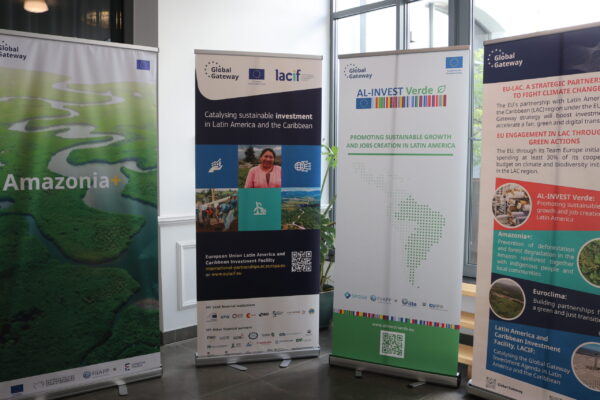-
21 July 2023
Category : Sin categorizar
11-digit standards, policies and values
The FIIAPP is ready to support Global Gateway's renewed commitment to the Euro-Latin American space and the new approach to Latin America

45 000 000 000 (45 billion euros) for Latin America. This was announced on Tuesday in Brussels by the President of the European Commission, Ursula von der Leyen, at the EU-CELAC summit. The meeting comes after eight years as one of the commitments of the Spanish Presidency of the European Union.
The funds will be used to finance digital, climate and energy, transport, health, education and research infrastructures. These priorities are part of the Global Gateway initiative, Europe’s strategy for sustainable and reliable connections to improve the lives of people and the planet. It is the European Union’s bid to position itself in the world.
The FIIAPP and the Spanish Cooperation are part of this effort and we welcome its economic rubric. From FIIAPP we will accompany it with specific projects such as Euroclima and Amazonía+ (on green transition policies), AL-INVEST (on sustainable agricultural trade and exports) or the Digital Alliance (with a specific component on data governance), among others. We will do it the way we know how to do things in our organisation: mobilising public talent from EU Member States’ institutions, establishing horizontal dialogues between counterpart administrations and listening and adapting the implementation of projects to the specific demands of each country. These elements are essential for European-style cooperation, inseparable from the promotion of values such as democracy, the rule of law, social cohesion and multilateralism.
The figure is significant, and the starry ring will now be more visible in many corners of the region, from the Andes to the Amazon and from the Caribbean to Patagonia. But the promised 11 digits will have meaning (and impact) only if three conditions are met:
1) that these investments last over time, 2) that they reach a massive number of people, leaving no one behind and 3) that they are geared towards achieving concrete development results such as access to basic services like justice, education or health, sustainable economic growth, environmental protection or reducing inequality, which are so important in the final stretch of the 2030 Agenda. And this cannot be done by cement or coltan. This is where public institutions and systems come into play, to provide the structures (the hardware) with the necessary software to function: rules, laws and public policies that adequately guide investments, make them accessible to all people, provide for their sustainability and ensure that they fit in with the development priorities of our partner countries.
At the FIIAPP we are ready to support this renewed commitment to the Euro-Latin American space and the new approach to Latin America, one of the European Union’s natural and preferential partners. Beyond trade and investment relations, we are united by solid ties based on our shared values. We have been connecting institutions in the two regions for 25 years. From here, our entire team will continue to work so that, beyond numbers, Europe and Latin America will be a partnership based on values, aimed at tackling shared challenges with a roadmap in the form of a common development agenda.
Specialists of our European cooperation projects assess, from their experience, the importance of public technical cooperation:
“From the European cooperation programme AL-INVEST Verde, we cooperate with Latin American public institutions to promote public policies that facilitate the adaptation of their agro-export sectors to the sustainability standards of the European Union. It is essential that we work hand in hand to build a solid and consistent regulatory framework that encourages the adoption of sustainable practices throughout the production chain. Beyond economic investment, collaboration between European and Latin American specialists generates a comprehensive approach that guarantees the use of best practices for sustainable development”.
Emilio Calvo. Director of AL-INVEST Verde
“Protecting data is protecting rights. In a globalised world, it is necessary that all countries offer the same guarantees when it comes to protecting the data of all citizens. Common public policies avoid fragmentation in the use of data, where people’s rights are most vulnerable. The large multinationals negotiate country by country, looking for where the legislation favours them most, so if there are public policies and common legislative frameworks, all states and regions can speak from the same position with the largest technology companies. People’s rights and freedoms are better protected when the region’s policies are aligned with each other, and if they are also in line with the EU, we will be able to provide more global responses to global problems. To achieve this, in addition to funding cooperation, it must be equipped with expert hands that can work from connected public systems around the world”.
Rosario Heras. Data Governance Expert of the EU-LAC Digital Alliance Support Programme
“The energy transition must be the vehicle to reduce social and economic gaps by ensuring that the benefits are shared equitably. This means taking into consideration the most vulnerable groups such as youth, indigenous communities or women by facilitating their full participation in decision-making. This is why the EU’s Global Gateway Strategy is so vital, as it includes three fundamental pillars for this: research, education and action for climate empowerment.
Elsa Velasco. FIIAPP specialist in the European Euroclima programme
The views and opinions expressed in this blog are the sole responsibility of the person who write them.




